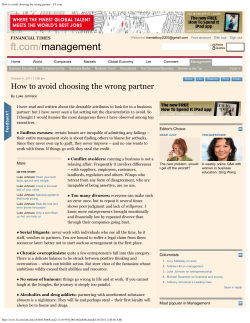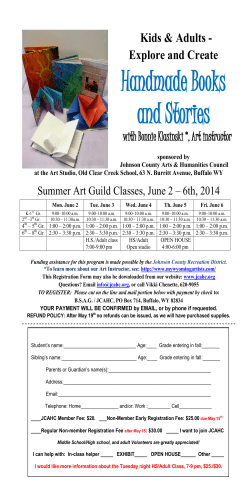
The Daisy Ad
Name: __________________________________ Class: ________________________________ The Daisy Ad Edited by CommonLit Staff In the 1964 Presidential election, Republican Barry Goldwater ran against the incumbent, President Lyndon B. Johnson. This election occurred at the height of the Cold War, a war between the U.S. and Soviet Russia which began just after World War II. It was called the Cold War because it did not involve all-‐out combat; instead, each side armed itself heavily in preparation for nuclear warfare. In the 1964 election, at the height of the Cold War with the USSR, Republican Barry Goldwater campaigned on a right-‐wing message of pursuing aggressive military action. Goldwater's campaign suggested a willingness to use nuclear weapons in situations when others would find that unacceptable. His opponent, the incumbent President Lyndon B. Johnson, used Goldwater's speeches to imply that Goldwater would willingly wage a nuclear war, quoting Goldwater: “by one impulse act you could press a button and wipe out 300 million people before sun down.” On September 7, 1964, President Johnson’s campaign aired the now-‐infamous “Daisy Girl Ad.” The commercial begins with a little girl (two-‐year-‐old Monique M. Corzilius) standing in a meadow with chirping birds, picking the petals of a daisy flower while counting each petal slowly. Because little Monique does not know her numbers perfectly, she repeats some and says others in the wrong order, all of which adds to her childlike appeal. When she reaches "nine", an ominous-‐ sounding male voice is then heard counting down a missile launch, and as the girl's eyes turn toward something she sees in the sky, the camera zooms in until her pupil fills the screen, blacking it out. When the countdown reaches zero, the blackness is instantly replaced by film of the bright flash and thunderous sound of a nuclear explosion, followed by a cut to footage of a billowing mushroom cloud. As the fireball ascends, the final cut is made, this time a cut to a close-‐up section of incandescence in the mushroom cloud, over which the viewer hears President Johnson’s voice: “These are the stakes. To make a world in which all of God's children can live, or to go into the dark. We must either love each other, or we must die.” Another voiceover then says, “Vote for President Johnson on November 3rd. The stakes are too high for you to stay home.” The ad was immediately pulled off television, but the point was made. The ad appeared on nightly news and conversation programs in its entirety. President Johnson won the 1964 election in a landslide victory, winning 486 electoral votes to Goldwater’s 52. Text-‐Based Questions: Directions: Answer the following questions in complete sentences. 1. Summarize the Daisy Ad in a few sentences. ______________________________________________________________________________________ ______________________________________________________________________________________ ______________________________________________________________________________________ ______________________________________________________________________________________ 2. What was the effect of President Lyndon B. Johnson’s voice-‐over at the end of the ad? Explain. ______________________________________________________________________________________ ______________________________________________________________________________________ ______________________________________________________________________________________ ______________________________________________________________________________________ 3. Does this advertisement appeal to a viewer’s sense of reason, sense of fear, both, or neither? Support your answer with evidence from the text. ______________________________________________________________________________________ ______________________________________________________________________________________ ______________________________________________________________________________________ ______________________________________________________________________________________ 4. Why do you think this ad was pulled off television? Explain your answer. ______________________________________________________________________________________ ______________________________________________________________________________________ ______________________________________________________________________________________ ______________________________________________________________________________________ Discussion Questions: Directions: Brainstorm your answers to the following questions in the space provided. Be prepared to share your original ideas in a class discussion. 1. Do you think this ad had an impact on the results of the 1964 elections? Explain. 2. Was this a fair commercial to run during the elections? Why or why not? 3. Should the government have a say in what ads can and can’t be aired during a Presidential election? Explain your answer. 4. How can fear be used to manipulate? Use evidence from this text, your own experience, and other art, literature, or history in your answer.
© Copyright 2026











